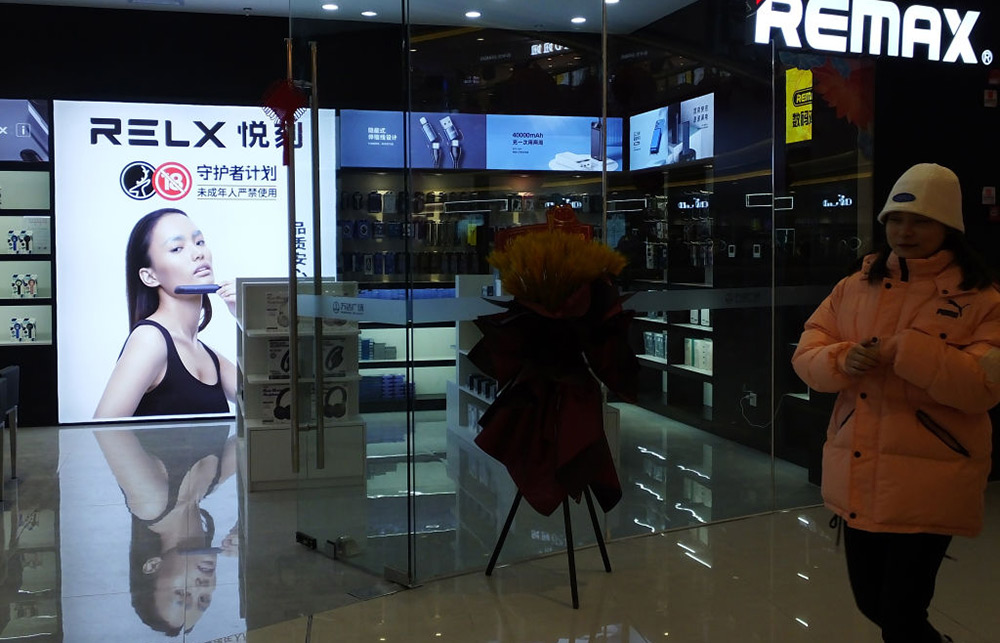
悅刻及其背后的母公司霧芯科技(Relx Technologies)作為中國最大的電子煙制造商,顯得有些太年輕了,年輕得還沒夠到可以抽煙的年紀。成立不到三年,就在中國發展得風生水起。中國是全球最大的卷煙市場,有大約3.1億煙民,銷售額達2100億美元。
盡管這是一家非常年輕的公司,悅刻還是于1月22日赴紐約證券交易所(New York Stock Exchange)公開上市,并進行了一場規模達14億美元的IPO。投資者迅速將悅刻的股價推高了近100%,使這家電子煙公司的市值膨脹至350億美元。
總部位于香港的金融管理集團銀行大和資本(Daiwa Capital Markets)的董事黎家禧(Carlton Lai)說:“悅刻IPO的成功一點也不令人驚訝。”“悅刻是第一個在美上市的大型獨立電子煙品牌,在中國擁有100%的曝光率,而中國仍然是電子煙滲透率非常低且快速增長的市場。”
該公司的數據顯示,悅刻控制著中國電子煙市場60%的份額,在2020年前9個月的銷售額為3.24億美元。該公司還預測,到2023年,中國整個電子煙行業的收入將從2019年的15億美元激增至113億美元。
但是,由于政府還未能敲定應該將電子煙歸于煙草行業還是技術行業,不僅是悅刻,整個中國電子煙業市場的發展都面臨著監管環境不確定性的威脅。
電子煙
世界上的第一支電子煙是由一位名為韓力的藥劑師在2003年于中國發明的,當時,他正在努力地嘗試戒煙。但是,電子煙在其誕生國的銷售卻很緩慢。根據中國灼識咨詢公司的數據,中國的電子煙在成年煙民中的滲透率約為1.2%,而美國則是32%。然而,自2016年以來,中國的電子煙滲透率增長了三成——該機構估計的增長率是0.4個百分點。
隨著電子煙在中國愈發流行,國家開始為這一行業制定新的規范。2018年,國家市場監管總局和中國煙草(中國卷煙的國資企業)規定,購買電子煙的合法年齡定為18歲,與煙草相同。以前,電子煙的銷售沒有年齡限制。隨后,中國政府于2019年全面禁止了電子煙在線上的銷售活動和廣告宣傳——政府正在逐步采取措施,規范這一市場。
和美國食品與藥品監督管理局(Food and Drug Administration)于2016年出臺規定、將電子煙廠商視為煙草公司加以監管不同,中國的監管機構已經不再對電子煙行業發布整體的規定,而是將其視為另一種商業消費類技術產業。
“在全球的主要市場中,中國是唯一沒有明確電子煙監管框架的國家。因此,我們認為,政府在如何監管該行業方面,仍然存在很多不確定性。”黎家禧說。
美國電子煙生產商Juul就在2019年經歷過這種不確定的監管環境。那時,就在Juul上線中國幾大電商網站后的幾天,中國就禁止了電子煙的在線銷售。Juul被迫倉皇撤出中國市場,悅刻也突然斷了線上的收入來源——這筆收入先前占其銷售額的26%。
盡管法規發生了變化,但與前一年同期相比,悅刻的銷售額在2020年的前9個月增長了176%。該公司拒絕對本文發表評論,因為它正處于IPO后的“安靜期”。但去年1月,悅刻承諾,將投資7700萬美元,于2023年之前在全球開設1萬家門店。
根據該公司的招股說明書,悅刻在中國已經擁有5,000家“品牌合作伙伴門店”,其產品還能夠在其他10萬家零售商處購買。
咳嗽者
悅刻的快速擴張戰略很容易理解——斥資數百萬美元將門店遍布中國——是科技類創業公司的典型做法。悅刻的創始人及首席執行官汪瑩是Uber中國和本土打車應用滴滴出行的前高管,滴滴于2016年收購了Uber中國。
悅刻創始人的技術背景或許可以解釋中國政府將電子煙歸于消費技術類的政策。但是,一些地方級行政單位已經修改了各市的相關法規,以處理類似于傳統卷煙的電子煙。例如,深圳市于2019年對電子煙實行了等同于煙草的監管政策,要求電子煙零售商也要展示“吸煙有害健康”的警告標志。
香港中文大學教授劉鋒說:“很難說把電子煙歸于哪一類。”他表示,政府想要阻止電子煙在年輕人中蔚然成風,但是又不愿意完全壓榨這個行業,因為這會引起消費者的強烈反對。
但是,由國家控股的中國煙草的子公司已經開發了自己的電子煙生產線,并且如果它能夠占領市場,也會決定加入這場競爭。市場研究公司歐睿(Euromonitor)的數據顯示,這家國有巨頭占了中國卷煙銷售量的97%。(財富中文網)
編譯:陳聰聰
悅刻及其背后的母公司霧芯科技(Relx Technologies)作為中國最大的電子煙制造商,顯得有些太年輕了,年輕得還沒夠到可以抽煙的年紀。成立不到三年,就在中國發展得風生水起。中國是全球最大的卷煙市場,有大約3.1億煙民,銷售額達2100億美元。
盡管這是一家非常年輕的公司,悅刻還是于1月22日赴紐約證券交易所(New York Stock Exchange)公開上市,并進行了一場規模達14億美元的IPO。投資者迅速將悅刻的股價推高了近100%,使這家電子煙公司的市值膨脹至350億美元。
總部位于香港的金融管理集團銀行大和資本(Daiwa Capital Markets)的董事黎家禧(Carlton Lai)說:“悅刻IPO的成功一點也不令人驚訝。”“悅刻是第一個在美上市的大型獨立電子煙品牌,在中國擁有100%的曝光率,而中國仍然是電子煙滲透率非常低且快速增長的市場。”
該公司的數據顯示,悅刻控制著中國電子煙市場60%的份額,在2020年前9個月的銷售額為3.24億美元。該公司還預測,到2023年,中國整個電子煙行業的收入將從2019年的15億美元激增至113億美元。
但是,由于政府還未能敲定應該將電子煙歸于煙草行業還是技術行業,不僅是悅刻,整個中國電子煙業市場的發展都面臨著監管環境不確定性的威脅。
電子煙
世界上的第一支電子煙是由一位名為韓力的藥劑師在2003年于中國發明的,當時,他正在努力地嘗試戒煙。但是,電子煙在其誕生國的銷售卻很緩慢。根據中國灼識咨詢公司的數據,中國的電子煙在成年煙民中的滲透率約為1.2%,而美國則是32%。然而,自2016年以來,中國的電子煙滲透率增長了三成——該機構估計的增長率是0.4個百分點。
隨著電子煙在中國愈發流行,國家開始為這一行業制定新的規范。2018年,國家市場監管總局和中國煙草(中國卷煙的國資企業)規定,購買電子煙的合法年齡定為18歲,與煙草相同。以前,電子煙的銷售沒有年齡限制。隨后,中國政府于2019年全面禁止了電子煙在線上的銷售活動和廣告宣傳——政府正在逐步采取措施,規范這一市場。
和美國食品與藥品監督管理局(Food and Drug Administration)于2016年出臺規定、將電子煙廠商視為煙草公司加以監管不同,中國的監管機構已經不再對電子煙行業發布整體的規定,而是將其視為另一種商業消費類技術產業。
“在全球的主要市場中,中國是唯一沒有明確電子煙監管框架的國家。因此,我們認為,政府在如何監管該行業方面,仍然存在很多不確定性。”黎家禧說。
美國電子煙生產商Juul就在2019年經歷過這種不確定的監管環境。那時,就在Juul上線中國幾大電商網站后的幾天,中國就禁止了電子煙的在線銷售。Juul被迫倉皇撤出中國市場,悅刻也突然斷了線上的收入來源——這筆收入先前占其銷售額的26%。
盡管法規發生了變化,但與前一年同期相比,悅刻的銷售額在2020年的前9個月增長了176%。該公司拒絕對本文發表評論,因為它正處于IPO后的“安靜期”。但去年1月,悅刻承諾,將投資7700萬美元,于2023年之前在全球開設1萬家門店。
根據該公司的招股說明書,悅刻在中國已經擁有5,000家“品牌合作伙伴門店”,其產品還能夠在其他10萬家零售商處購買。
咳嗽者
悅刻的快速擴張戰略很容易理解——斥資數百萬美元將門店遍布中國——是科技類創業公司的典型做法。悅刻的創始人及首席執行官汪瑩是Uber中國和本土打車應用滴滴出行的前高管,滴滴于2016年收購了Uber中國。
悅刻創始人的技術背景或許可以解釋中國政府將電子煙歸于消費技術類的政策。但是,一些地方級行政單位已經修改了各市的相關法規,以處理類似于傳統卷煙的電子煙。例如,深圳市于2019年對電子煙實行了等同于煙草的監管政策,要求電子煙零售商也要展示“吸煙有害健康”的警告標志。
香港中文大學教授劉鋒說:“很難說把電子煙歸于哪一類。”他表示,政府想要阻止電子煙在年輕人中蔚然成風,但是又不愿意完全壓榨這個行業,因為這會引起消費者的強烈反對。
但是,由國家控股的中國煙草的子公司已經開發了自己的電子煙生產線,并且如果它能夠占領市場,也會決定加入這場競爭。市場研究公司歐睿(Euromonitor)的數據顯示,這家國有巨頭占了中國卷煙銷售量的97%。(財富中文網)
編譯:陳聰聰
Relx Technologies, China's largest e-cigarette maker, is far too young to smoke. Founded just under three years ago, the young vape maker has flourished in China—the world’s largest cigarette market with around 310 million smokers and $210 billion in sales.
Despite its youth, Relx went public on January 22, launching a $1.4 billion IPO on the New York Stock Exchange. Investors quickly puffed Relx's share price up nearly 100%, inflating the e-cigarette firm's market cap to $35 billion.
“The success of Relx’s IPO was not a surprise at all,” says Carlton Lai, director of Hong Kong-based financial management group bank Daiwa Capital Markets. “Relx is the first major standalone vape brand to go public in the U.S., and it has 100% exposure to China, which is still a market with very low penetration and rapidly growing.”
According to the company’s own data, Relx controls 60% of China’s vape market with sales of $324 million in the first nine months of 2020 and it predicts industry-wide revenue in China will surge from $1.5 billion in 2019 to $11.3 billion in 2023.
But Relx’s growth—and the growth of China’s vape scene in general—is threatened by a hazy regulatory environment due to Beijing's inability to decide whether to classify e-cigarettes as tobacco or tech.
Vapor trail
The world’s first e-cigarette was invented in China, by a pharmacist named Hon Lik, who was trying to quit smoking in 2003. But the electronic product was slow to take off in its country of origin. According to China Insights Consultancy (CIC), penetration of e-cigarettes in China is at roughly 1.2% of the adult smoker population, compared to 32% in the U.S. Nevertheless, the penetration rate in China has increased threefold since 2016, when CIC estimates it was at 0.4%.
As vaping became more popular in China, Beijing moved to regulate the emerging practice. In 2018, the State Administration for Market Regulation and China Tobacco—the state-owned monopoly on cigarette production in China—set the legal age for buying e-cigarettes at 18, the same as tobacco. Previously there had been no age limit on vape sales. Beijing then banned the online sale and advertising of e-cigarettes completely in 2019, as the government continued its piecemeal approach to regulating the market.
Unlike in the U.S., where the Food and Drug Administration (FDA) decided to regulate e-cigarette makers as tobacco companies in 2016, Beijing’s regulators have stopped short of issuing comprehensive rules for the vape industry and have instead treated it as just another consumer tech business.
“China is the only major market globally that does not have a clear regulatory framework on e-cigarettes. As such, we believe there’s still a lot of uncertainty over how the government would regulate the industry,” Lai says.
U.S.-based vape maker Juul was the victim of that uncertainty in 2019, when China banned the online sale of vapes days after Juul launched on China’s leading e-commerce sites. Juul was forced into a hasty retreat from China, while Relx suddenly lost its online revenue stream, which had previously accounted for 26% of its sales.
Despite the shifting regulation, Relx’s sales grew 176% in the first nine months of 2020 compared to the same period a year earlier. The company declined to comment on this article, since it is in a post-IPO “quiet period,” but last January Relx committed $77 million to open 10,000 stores worldwide by 2023.
According to the company's prospectus, Relx already has 5,000 "brand partner stores" in China—a relationship the company says "may be deemed to be franchisees" under China law—and its products are available at 100,000 other retailers.
Coughers
Relx’s rapid growth strategy—investing millions to establish a presence across China—is a classic move in the tech start-up playbook. No wonder: Relx’s founder and CEO, Kate Wang, is a former executive at Uber China and Didi Chuxing, the local ride-hailing app that bought out Uber China in 2016.
The tech background of Relx’s founders might give credence to Beijing’s policy of treating vaping as consumer tech. Some local jurisdictions, however, have already amended municipal laws to treat e-cigarettes akin to traditional cigarettes. Shenzhen brought e-cigs under the tobacco umbrella in 2019, for instance, requiring vape shops to display signs warning that smoking is bad for your health.
“It’s difficult to say where the central government will land on e-cigarettes,” says Liu Feng, a professor at Chinese University of Hong Kong who focuses on the economics of vice habits. According to Feng, authorities are keen to discourage vaping as a trend among young people, but they're reluctant to endure a consumer backlash by squashing the industry entirely.
However, subsidiaries of state monopoly China Tobacco have developed their own own e-cigarette line and could dominate the market if it decides to enter the fray. The state-owned giant accounts for 97% of China's cigarette sales, according to market researcher Euromonitor.






